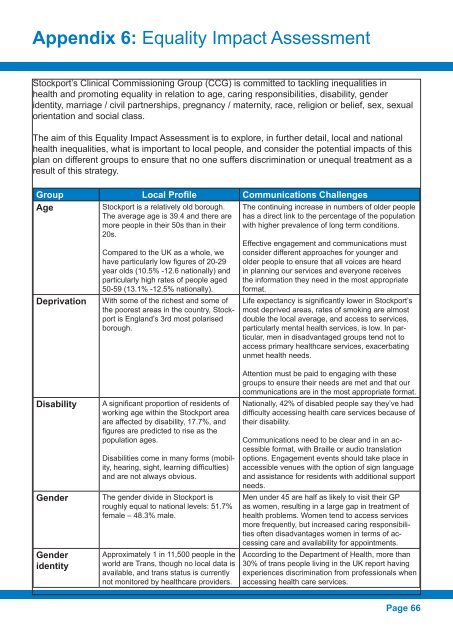Q32-Comms-Engt-Strategy
Q32-Comms-Engt-Strategy
Q32-Comms-Engt-Strategy
You also want an ePaper? Increase the reach of your titles
YUMPU automatically turns print PDFs into web optimized ePapers that Google loves.
Appendix 6: Equality Impact Assessment<br />
Stockport’s Clinical Commissioning Group (CCG) is committed to tackling inequalities in<br />
health and promoting equality in relation to age, caring responsibilities, disability, gender<br />
identity, marriage / civil partnerships, pregnancy / maternity, race, religion or belief, sex, sexual<br />
orientation and social class.<br />
The aim of this Equality Impact Assessment is to explore, in further detail, local and national<br />
health inequalities, what is important to local people, and consider the potential impacts of this<br />
plan on different groups to ensure that no one suffers discrimination or unequal treatment as a<br />
result of this strategy.<br />
Group Local Profile Communications Challenges<br />
Age<br />
Stockport is a relatively old borough. The continuing increase in numbers of older people<br />
The average age is 39.4 and there are has a direct link to the percentage of the population<br />
more people in their 50s than in their<br />
20s.<br />
with higher prevalence of long term conditions.<br />
Effective engagement and communications must<br />
Compared to the UK as a whole, we consider different approaches for younger and<br />
have particularly low figures of 20-29 older people to ensure that all voices are heard<br />
year olds (10.5% -12.6 nationally) and in planning our services and everyone receives<br />
particularly high rates of people aged the information they need in the most appropriate<br />
50-59 (13.1% -12.5% nationally). format.<br />
Deprivation With some of the richest and some of Life expectancy is significantly lower in Stockport’s<br />
the poorest areas in the country, Stock- most deprived areas, rates of smoking are almost<br />
port is England’s 3rd most polarised double the local average, and access to services,<br />
borough.<br />
particularly mental health services, is low. In particular,<br />
men in disadvantaged groups tend not to<br />
access primary healthcare services, exacerbating<br />
unmet health needs.<br />
Disability<br />
Gender<br />
Gender<br />
identity<br />
A significant proportion of residents of<br />
working age within the Stockport area<br />
are affected by disability, 17.7%, and<br />
figures are predicted to rise as the<br />
population ages.<br />
Disabilities come in many forms (mobility,<br />
hearing, sight, learning difficulties)<br />
and are not always obvious.<br />
The gender divide in Stockport is<br />
roughly equal to national levels: 51.7%<br />
female – 48.3% male.<br />
Approximately 1 in 11,500 people in the<br />
world are Trans, though no local data is<br />
available, and trans status is currently<br />
not monitored by healthcare providers.<br />
Attention must be paid to engaging with these<br />
groups to ensure their needs are met and that our<br />
communications are in the most appropriate format.<br />
Nationally, 42% of disabled people say they’ve had<br />
difficulty accessing health care services because of<br />
their disability.<br />
Communications need to be clear and in an accessible<br />
format, with Braille or audio translation<br />
options. Engagement events should take place in<br />
accessible venues with the option of sign language<br />
and assistance for residents with additional support<br />
needs.<br />
Men under 45 are half as likely to visit their GP<br />
as women, resulting in a large gap in treatment of<br />
health problems. Women tend to access services<br />
more frequently, but increased caring responsibilities<br />
often disadvantages women in terms of accessing<br />
care and availability for appointments.<br />
According to the Department of Health, more than<br />
30% of trans people living in the UK report having<br />
experiences discrimination from professionals when<br />
accessing health care services.<br />
Page 66


